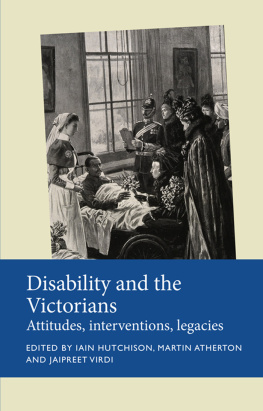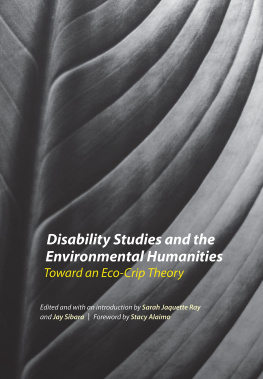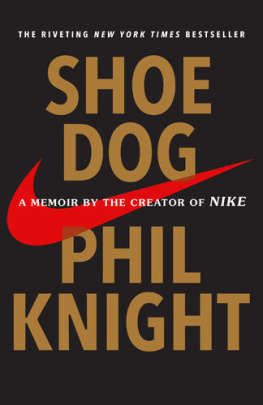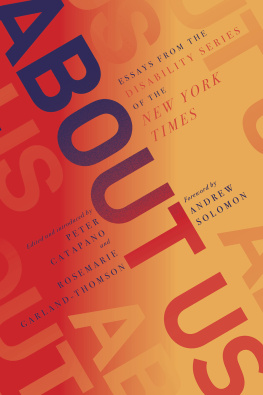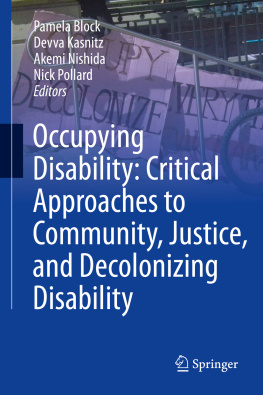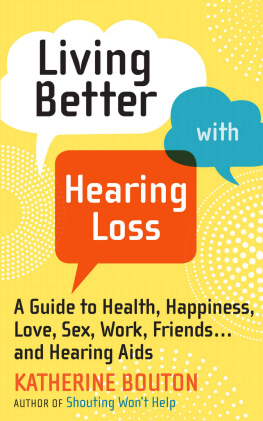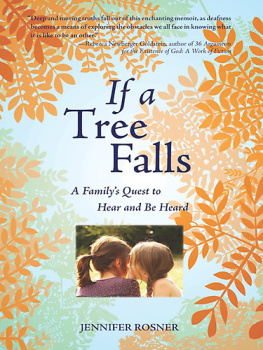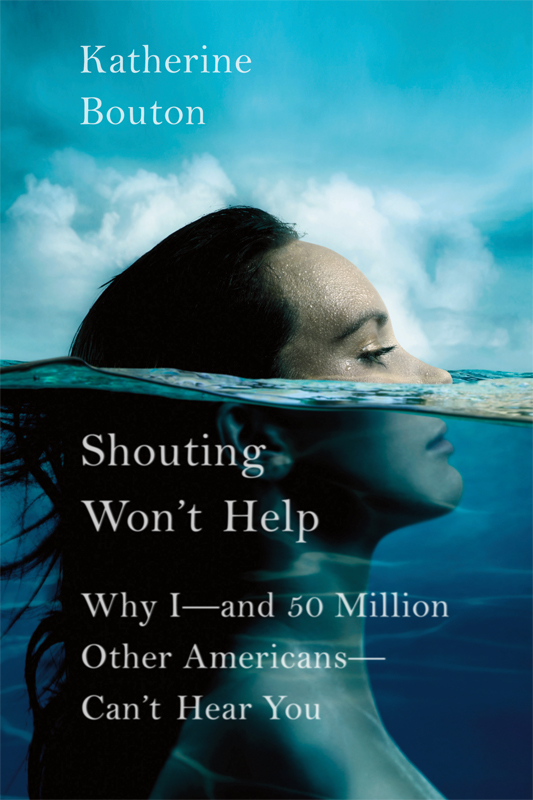
The author and publisher have provided this e-book to you for your personal use only. You may not make this e-book publicly available in any way. Copyright infringement is against the law. If you believe the copy of this e-book you are reading infringes on the authors copyright, please notify the publisher at: us.macmillanusa.com/piracy.
For Dan
Contents
Introduction to the 2014 Edition
How many people do you know who are deaf? Not stone-deaf, but not able to hear much either. How many do you know who say What? too often, who seem uncharacteristically befuddled or aloof, who dont go to parties anymore? Not Deaf, with a capital D . Just deaf. Deaf like me.
When I was thirty, one minute I could hear and the next I couldnt. My left ear went dead. Eventually, I regained some of the hearing, but not all. I was young, and I ignored it (just as I ignored the recommendation for a hearing aid). It never occurred to me that this was the first step toward a far more serious impairment. In the years that followed, I would experience other random assaults on my hearing, and by the time I was forty my hearing loss was serious enough to affect my daily life. By fifty, I was losing the hearing in the other ear as well, and wore hearing aids in both ears. By sixty, I was functionally deaf.
I have sensorineural hearing loss, the kind that affects the majority of people with hearing loss. It is usually caused by a defect in the hair cells of the inner ear. What caused the defect in my hair cells remains a mystery, as it does for 75 percent of people who experience sudden hearing loss. I do hear, thanks to a cochlear implant in my left earsurgically embedded in my skulland a powerful hearing aid in my right. But like many people with severe hearing loss, my hearing cannot be fully corrected. Even with both devices, I say What? so often that my husband has asked me to occasionally substitute Pardon me? or Huh? I like Sorry?
People with moderate to severe loss cant hear if they cant see the speaker face to face. They cant hear in a group. They cant hear in an airport terminal or on a noisy street. I cant either. But without my devices I also cant hear an alarm clock, a fire alarm, the telephone ringing, the vacuum cleaner, a siren. I can sleep through a violent thunderstorm. Ive been known to sleep through my iPhone alarm, my Shake-n-Wake vibrating alarm clock, and a hotel wake-up callall on the same morning.
Chances are you know quite a few people who have trouble hearing. But you probably dont always know who they are. Hearing loss is one of Americas best-kept secrets. People dont want to acknowledge hearing loss. They fear that its a sign of aging.
Because hearing loss is a hidden disability, its very hard to state how many people it affects. The National Institute on Deafness and Other Communication Disorders (NIDCD) states that 36 million people, or 17 percent of the population, report some degree of hearing loss. (On the face of it, this figure makes no sense. The 2013 population is 315 million17 percent of that is 53 million.) Yet, in 2011, Frank Lin and colleagues at Johns Hopkins published a well-regarded study establishing that 48 million have some degree of loss. How can such a basic piece of informationthe number of people with hearing lossvary so widely?
Lins study used audiometric tests to assess whether a participant had hearing loss. The NIDCD bases its number on self-report, a method that is not likely to provide an accurate figure: many people dont acknowledge hearing loss even to themselves. Most hearing loss organizations, including the Hearing Health Foundation, now accept Frank Lins figure of 48 million as the most accurate.
But however you count it, nearly one in five people, across all age groups, has trouble understanding speech, and many cannot hear certain sounds at all.
* * *
When I first learned how many Americans had hearing loss, I was astounded. Tens of millions more people with hearing problems than vision problems? Why dont we know this? Once again, the explanation is the association of hearing loss with aging.
The older you are, its true, the more likely youll have hearing loss. Butand this can be hard to get your mind aroundmore than half the people in America with hearing loss are under the age of fifty-five. Among American males with hearing loss, the NIDCD tells us, 32 percent began to lose their hearing between the ages of twenty and thirty-nine, and another 32 percent between forty and fifty-nine. Sixty-four percent of American males with hearing loss, that is, began to lose their hearing before they were sixty. Hearing loss affects every age group, including adolescents. A 2010 study found that 19.5 percent of teens have at least slight hearing loss, and 5 percent have hearing loss so serious they cant hear a whisper. Your teenager may not be ignoring you but truly may not hear you.
Those numbers should dispel the myth that hearing loss is a condition of aging. Unfortunately, they dont. And heres why:
Hearing loss may not be a condition of aging, but it is a condition of the elderly. Two-thirds of Americans seventy and older have a hearing impairment. But in only 8 percent of men and 16 percent of women did the loss begin after the age of seventy. The vast majority had started to lose their hearing decades earlier. Since many younger people are loathe to admit the loss, the result is the misperception that people with hearing loss are elderly.
The overall number of people with hearing loss should have gone down, rather than up. We have eliminated most of the childhood diseases, like meningitis, scarlet fever, mumps, and measles, that can cause hearing loss. Our society has moved from a noisy industrial manufacturing base to a postindustrial service- and information-based economy. OSHA regulates noise exposure in the workplace. We are healthier than ever. Life expectancy keeps going up.
Worldwide, 380 million people have disabling hearing loss, according to a 2013 report by the World Health Organization. The economic impact is enormous: In developing countries, children with hearing loss and deafness rarely receive any schooling, the report states. Adults with hearing loss also have a much higher unemployment rate.
* * *
Not only can it be hard to admit to hearing loss, but because the onset is usually gradual, its also sometimes unrecognized. Friends and family may point out that a loved one seems to be having trouble hearing, only to be met with excuses. I can hear just fine People talk too fast Its too noisy in this restaurant at this party on this bus. The phone isnt working properly My wife mumbles.
Only one in five people who could benefit from a hearing aid uses one, according to the NIDCD. But just as people deny hearing loss, they overstate hearing aid use. They may own hearing aids, but keep them in a drawer. Frank Lin also studied hearing aid use, again using audiometric testing. He found that only one in seven over the age of fifty who could benefit used hearing aids. (For working-age adults fifty to fifty-nine, the number drops to one in twenty.) In developing countries, according to WHO, the number is one in forty. The average lapse between the time a doctor recommends hearing aids and the time the user actually gets them is seven years. Many wait decades. I did.
But you ignore hearing loss at your peril, and not only from the depression and isolation that accompanies untreated hearing loss. As I realized when I got a cochlear implant, it had been so many years since Id heard anything out of that left ear that I had, in essence, forgotten how to. The speech pathways in my brain had altered to a point where rebooting them was very difficult.


